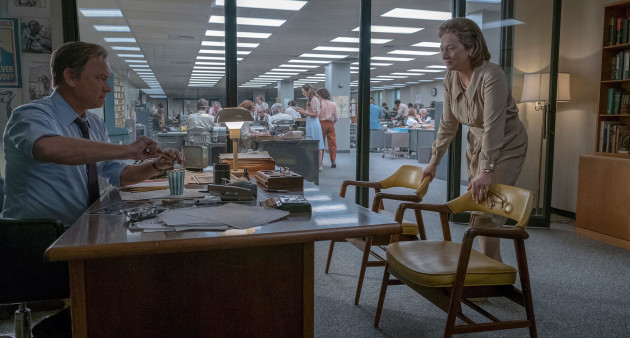
by Aileen Jacobson
When a Woman Made Decisions at Washington Post: New Movie Tells All. Or Most.

The Post, 20th Century Fox
“The Post,” a new movie starring Meryl Streep and Tom Hanks and directed by Steven Spielberg, could be seen mainly as a saga about the Vietnam-era Pentagon Papers. Or it could be seen as a film about the workings of a newspaper—in this case, The Washington Post.
But, really, what it most feels like is a story about the evolution of a feminist, or at least the beginnings of that evolution. That emerging feminist is Katherine Graham, then the publisher of the Washington Post, a position that had been thrust upon her after her husband’s suicide. She had to make the difficult decision of whether to print contents of the leaked Pentagon Papers despite threats of criminal charges from the White House and warnings from bankers that the move could lead to her company’s demise.
The film was released in select theaters yesterday (December 22) and will be released more broadly on January 12.
My perspective may be partly informed by my own experience. I worked at the Post at the time, June 1971, when the film’s story takes place. I was a summer intern, which led to a three-year stint as a Post reporter during an era that also included Watergate and the growth of the women’s movement.
Just a year after I started, I was among 117 women who filed a sex-discrimination suit with the Economic Opportunity Commission against the Post. It was settled in 1980 with small monetary awards for each of us, an affirmative action plan and funds for programs to help female employees, without the Post admitting that it discriminated. I admired Graham greatly, but I learned that having a woman on top does not guarantee a trickle-down effect.
During my tenure at the Post, I persuaded the (male but feminist-friendly) editors of Outlook, the Sunday opinion section, to let me guest-edit an entire section about the changing roles of women. Still, I toggled between writing long serious articles and co-compiling a jaunty listing of things to do, places to visit, items to shop for.
Streep inhabits the role of Graham with her usual fierce intensity in a film with many subtle touches. The screenwriters present telling moments that are highlighted in Spielberg’s sharp and quick-paced direction. Deftly, Spielberg keeps up the suspense even for viewers who know the outcome. But most of us don’t know the minutiae, even those of us who were in the Post building while all of this was going on. You can see Graham’s everyday warm family life, fraught business life and tradition-laden social life.
In one scene, at a dinner party Graham attends, the men stay at the table afterward for a presumed serious discussion while the women repair to a parlor supposedly to gossip and talk about their children. Graham goes with the women as a matter of course, though she does seem a little uncomfortable. Several times, we see Graham enter business meetings in which she is the only woman in a sea of dark-suited men. In one such meeting, she makes a point that doesn’t get heard until a man says the same thing—a phenomenon most women are familiar with, even today.
Graham’s growing awareness of a woman’s place and power is part of what fascinated Liz Hannah, who launched the project and co-wrote the screenplay with Josh Singer. As the film repeatedly points out, and as Graham gracefully wrote in Personal History, her Pulitzer Prize-winning autobiography published in 1997, she still accepted traditional views of women’s weaknesses and second-class status when she had to make her decision about printing government papers filled with damaging information about the United States role in Vietnam.
Daniel Ellsberg, the whistle blower, was a military analyst who was born to a Jewish family that had converted to Christian Science. Nevertheless, he was considered Jewish by many people, including President Nixon, as Ellsberg himself reminded a Financial Times writer earlier this month. “Most Jews are disloyal,” Nixon had infamoulsy said, referring to Ellsberg. “You can’t trust the bastards. They turn on you.”
The New York Times had already published articles on the papers but had stopped because of a court injunction. The Post had an opportunity not only to outplay a major rival but to strike a blow for freedom of the press—a goal forcefully promoted by Ben Bradlee, the charismatic editor of the Post charmingly played by Hanks. However, bankers warned that they might rescind the public stock offering intended to save the newspaper’s finances if the Post took the risky step of publishing more about the leaked papers. Nixon’s White House threatened Graham and others with jail.
“She stepped up and became the kind of person she would be for the rest of her life,” Hannah told one interviewer.
You can’t turn your eyes away as Streep’s performance reveals insecurities, indecision and finally a triumphant, “Let’s go.”